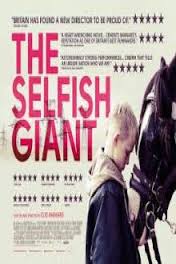
THE SELFISH GIANT
UK, 2013, 91 minutes, Colour.
Conor Chapman, Sean Thomas, Sean Gilder, Siobhan Finneran.
Directed by Clio Barnard.
While this contemporary film, a bleak look at life in Yorkshire, especially the children, is inspired by Oscar Wilde’s story of The Selfish Giant, there is none of Oscar Wilde’s comedy, rather a reflection on his own sad experiences, his imprisonment, his being thrown back on awareness of human betrayal, love thwarted, separation from home and family, confinement leading to his death.
The director whose films come to mind while we are watching The Selfish Giant is Ken Loach, his films of social realism over many decades, especially his 1968 film about a young boy and a bird, Kes. But there was far more immediate uplift in Loach’s film.
This story focuses on two young boys, Arbor and Swifty. The performances by Conor Chapman and Sean Thomas are very fine indeed, completely credible, especially for Conor Chapman portraying a very disturbed young boy. We see this right from the beginning, his disturbed sleep, waking, hyper with his brother and mother, needing to take pills to steady him. His trouble at school, defying the teachers, defying other boys, but always relying on his friend, Swifty.
At the centre of the plot is the stealing of copper wire from the railways and selling it off to a dubious dealer, Kitten (Sean Gilder). Kitten is an abrupt man, living on the edge of the law, selling and reselling various goods, including the copper wire, and pocketing the money. To that extent, he is a bad influence on the two boys.
There are some lighter moments and touches, especially in a horse race with Swifty very concerned about the treatment of the horses. There is a sympathetic receptionist at the school where, after they are both suspended for misbehaviour, Swifty sits every day, influenced by his sad and earnest mother who urges him on to get an education. Swifty’s father is a brute of a man, yelling at his children, no patience or concern.
When tragedy strikes, Arbor hides himself, unable to deal with the events until some of the adults do some good for him – including, surprisingly, Kitten.
This is a first feature film from writer-director, Clio Barnard, who demonstrates and explores the sensibility and sensitivity to the young boys and their characters, their crises, seeming hopelessness. A number of reviewers have referred to the films treatment of its themes as “poetic” – a poetry of the goodness of life and the bleakness of human nature.
1. A grim portrait of British life? Bleak, hopeless, glimpses? UK 21st century, in the provinces?
2. The inspiration of the story by Oscar Wilde? The title? The giant, the garden, the witness, the children, change? The application of the key points of the story to this setting?
3. The gritty realism, muted colour, the language, the tensions? Yorkshire, the towns, homes, schools, the railway lines, the junk yards? Immersing the audience in this world?
4. Touches or glimpses of beauty, the horses and the stars, the open fields, the sheep, the countryside? The musical score?
5. The touches of the ugliness, the homes, the yards, the junk, the rail lines, the dead horse…?
6. Arbor and his tantrum, waking up, the support of his brother, the support of Swifty? His mother and life within the house? His brother, reckless, hyper, the need for the pills? Going to school, the yard and the kids, class and disruption, not picking up the pencil at the request of the teacher, defiant, kept back, in trouble, his expulsion, the reaction of his mother?
7. Swifty, friend, his family, his mother and concern about education, the harshness his father, at school, his helping Arbor, the bonds between the two? The horses and his tenderness? The boys mucking up? Finding the copper, selling it to Kitten? At school, Swifty and his sitting at school, quietly, going with Arbor, the information about the copper, going into the hole, touching it, the electric shock, his death? The effect on Arbor, on his mother?
8. The various deals, selling goods, Swifty’s father selling the sofa, the money for the rent? The meals and the beans? The father yelling, snarling? Kitten and his wife, the contact with the boys, her moments of sympathy, the horses, the race and the reaction, the cars behind the horses? Swifty concerned for the horses? The stash of copper wiring, reselling it? Kitten keeping the money? Wanting more? Kitten and his reaction to Swifty’s death, his wife’s reaction? His giving himself up to the police?
9. Arbor, his wandering, playing, the horses, the effect of Swifty’s death, sleep, going to visit Swifty’s mother, her shutting the door, his sitting outside, return home, his own mother’s care?
10. A slice of life, poverty, opportunity and lack of opportunity, family and support, lack of support, a world of thieves and deals, the legacy on the children?
11. Any glimpses of hope?